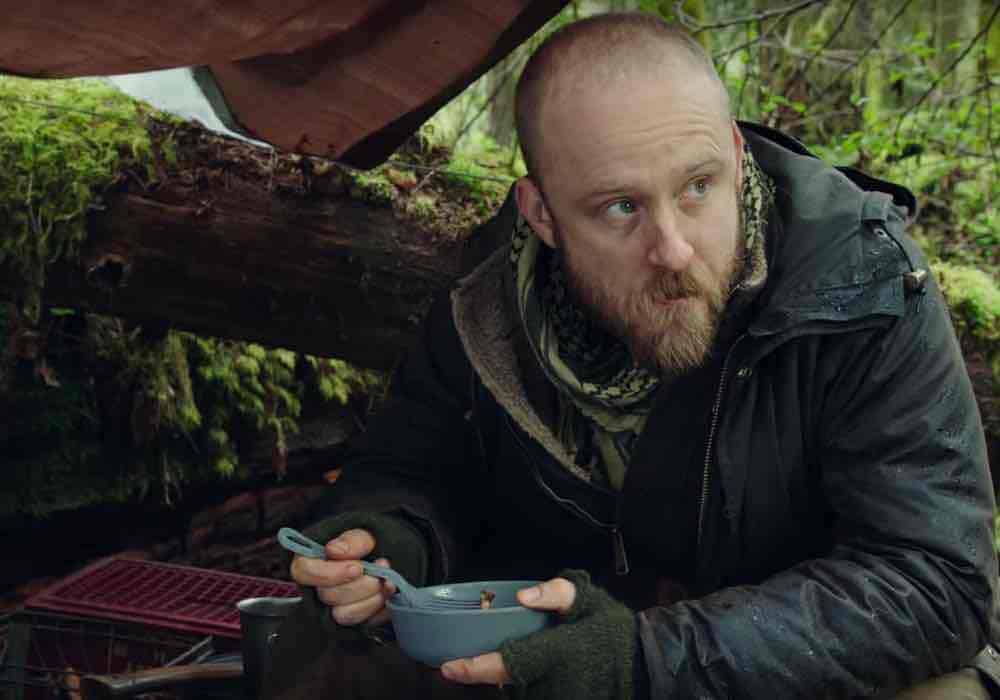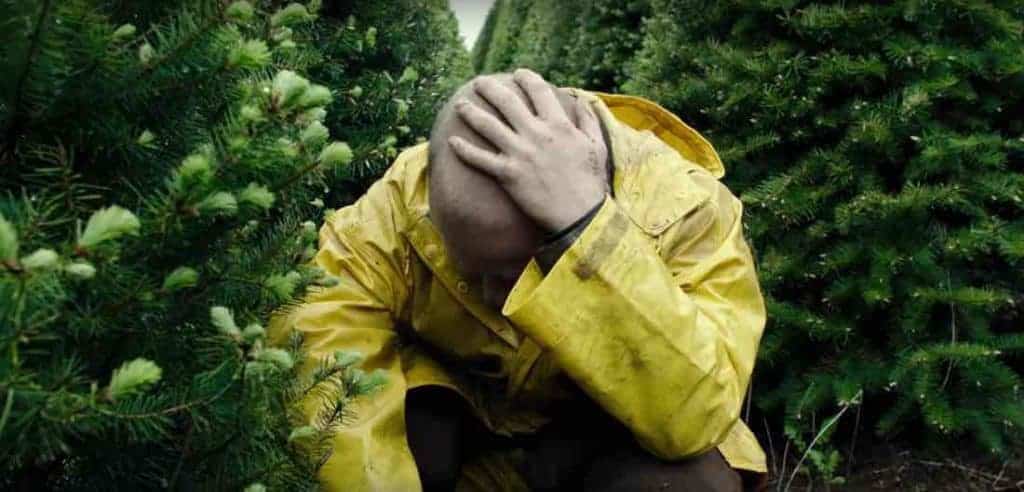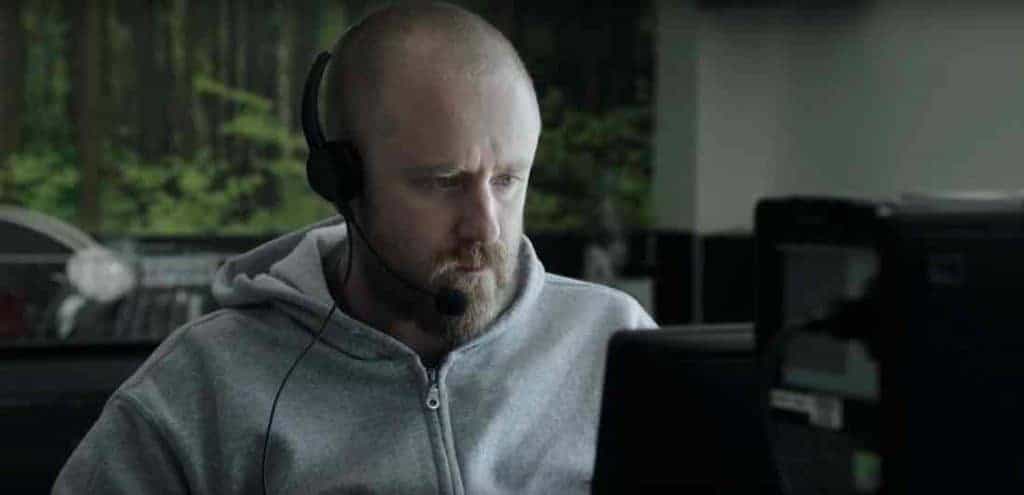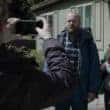In this interview, Ben Foster discusses how he prepared for his role as Will in Leave No Trace. This is an excerpt from the ebook Leave No Trace: A Special Issue. Get your copy here.

Discover one film you didn’t know you needed:
Not in the zeitgeist. Not pushed by streamers.
But still easy to find — and worth sitting with.
And a guide to help you do just that.
“Debra [Granik] and I were very drastic in how we simplified the script and redlined it down to its barest essentials,” Ben Foster told me about developing his character, Will, in Granik’s Leave No Trace. “If he wanted to say it, he wouldn’t say it. If he needed to say it, he would say it.” The result is a man of few words, but not a stereotypically stoic and laconic one. Will is a war veteran suffering from PTSD, a warm and loving father to Tom (Thomasin McKenzie), and a survivalist living in the woods with his daughter. His trauma is what drives his irrational behaviour, including the survivalist lifestyle, and ultimately, it’s what separates him from the daughter he adores.
Will’s comfort in the forest, at the beginning of the film, is palpable in Foster’s body language, which is open and free. His stride is confident and purposeful. He hums along with his daughter as they gather food and tend to their home. He spares a kind word for her whenever he can, though he never wastes one. “He felt very much at peace and most himself when he was free to live among the trees,” Foster said. His self-medicating was stripping himself of machinery, the vehicles, the phones, the guns. Those things would trigger him — chainsaws or helicopters — and would bring him back to a place in society where he served, perhaps, a violence that he now philosophically does not agree with.”
[wcm_nonmember][thrive_lead_lock id=’19429′]
[click_to_tweet tweet=”Watching Foster, you feel like you have a direct line to Will’s most private feelings and thoughts – even ones which the character himself may not understand or be aware of.” quote=”Watching Foster, you feel like you have a direct line to Will’s most private feelings and thoughts – even ones which the character himself may not understand or be aware of.”]
Watching Foster, you feel like you have a direct line to Will’s most private feelings and thoughts — even ones which the character himself may not understand or be aware of. The actor can see how Will’s trauma holds him back. “He’s having a hard time,” Foster told me. “He’s trying to hold onto his beliefs which may or may not be a bandaid for deeper issues. His particular traumas — he’s a bit blinded to them. In my opinion, and I don’t want to be overly judgmental, his take is stringent and spare and clean and present, whereas his daughter is trying to find balance. For him, it’s a matter of being able to function. He actually can’t function. That isn’t to say that he couldn’t with an individualized therapy, ‘cause it is out there. We don’t just have to go hide away or move to the woods to process — though touching nature is proven to create a much healthier mental landscape.”
Will wasn’t Foster’s first role as a soldier. He played the veteran Stanley Kowalski on stage in A Streetcar Named Desire as a loving, overgrown child who couldn’t control or understand his violent outbursts; his empathetic returned soldier in The Messenger was a man desperate to connect; the wily homeless veteran he played in Rampart was so damaged he had to become ruthlessly opportunistic; and his Navy SEALS sniper on active duty in Lone Survivor didn’t let the cold-blooded focus his job required prevent him from being a loving husband and the glue that held the soldiers together. His understanding of trauma, as an actor, is even deeper, having explored it from multiple facets: as a violent psychopath (Alpha Dog, The Mechanic, Hostage), a witness to violence (The Laramie Project), someone traumatized into violent behaviour (Bang Bang You’re Dead), and someone traumatized by microaggressions (X-Men: The Last Stand, Liberty Heights).
Find out how Will in Leave No Trace fits into Foster’s career s a whole >>
[click_to_tweet tweet=”Ben Foster: ‘We don’t just have to go hide away or move to the woods to process – though touching nature is proven to create a much healthier mental landscape.'” quote=”Ben Foster: ‘We don’t just have to go hide away or move to the woods to process – though touching nature is proven to create a much healthier mental landscape.'”]
In-depth research is key to Foster’s process as an actor. Over the years, he has spoken to many “men and women who served and shared their experiences of re-entry.” When he came to Leave No Trace, he was already well-versed in what it means to be a veteran. Like The Messenger, Leave No Trace looks at “what it means to return and find home,” the actor explained. “How does one create a new home, a new identity, when you’re out of the service? [Will] is taking a philosophical approach to his life with his daughter that though unusual makes sense to him. As there are no weapons in this film, it’s escape and evasion,” for which he needs quiet to listen. The stripped-back dialogue ruthlessly pruned by Foster and Granik means we can focus on what Will doesn’t say.

“In the forest, he could breathe, and when he left the forest, it was like drowning. You can only hold your breath for so long,” Foster told me. When Will and his daughter are forcibly removed, first to a social services centre to be assessed, and then to a Christmas tree farm, his physicality visibly shifts. He folds into himself, slouches, keeps his head down to avoid eye contact, and hurries when around others, attempting to flee back to the safety of his own home. While working on the farm, he “hears a helicopter high above. The symbolism of war is all too potent and overwhelming for him in that particular moment.” We see a shot of Will crouched and almost fetal, with his head down, rubbing his head slowly, his body tense: in those few seconds, Foster tells us everything we need to know about Will’s inability to cope.
[click_to_tweet tweet=”‘In the forest, he could breathe, and when he left the forest, it was like drowning. You can only hold your breath for so long.’ – Ben Foster” quote=”‘In the forest, he could breathe, and when he left the forest, it was like drowning. You can only hold your breath for so long.’ – Ben Foster”]
Even in the forest, any sudden or unexpected loud noise startles him: he jolts his head to listen intently, assessing the situation. He may have retreated from society, but civilization is always about to encroach on him. Part of Foster’s preparation was to prime himself to respond to any sound that might trigger Will. “Trauma that has gone untreated and unhealed will have many triggers,” Foster explained to me. “Being in society, around machinery, was triggering a lot of his own weak spots, none of which are articulated. The homework lends yourself to just being present during the day so if, as an example, someone’s door slams shut while we’re filming, I’ve primed myself where I’m not ignoring it. It might be a gunshot; it might be sniped fire; there might be a bomb going off. A hyper-sensitivity to input or stimulus can disrupt his natural ecosystem within and it’s a constant negotiation with every new influence.” Foster also worked with Special Ops expert Alan Kay to get deep into his bones the “constant readiness to disappear” that drives Will.
Even though Will is so defined by his trauma, it doesn’t prevent him from being a kind, attentive, and loving parent. This was key to Foster’s understanding of his character: “He has to be a parent and he’s trying the best that he can, despite his traumas, to rise above his own wounds, internal as they are.” He’s always watching Tom, checking in on her, making sure she’s OK, even when her state of mind isn’t the focus of the scene. He teaches her everything he knows, from survival skills to chess, and he’s willing to put everything on the line for her, including keeping her warm with his body.
[click_to_tweet tweet=”Ben Foster: ‘Trauma that has gone untreated and unhealed will have many triggers.'” quote=”Ben Foster: ‘Trauma that has gone untreated and unhealed will have many triggers.'”]
The first time he’s separated from Tom, and then reunited, he walks toward her with open arms while she runs to him. They embrace in a tight and needy hug; not knowing how or where the other one was was killing them both. Throughout the film, whenever Tom is feeling uncertain, he’ll give her a comforting nudge with his shoulder, a sweet sign of affection. When he disagrees with her decisions, whether it’s to use their precious stores of propane to cook their lunch or to rent out the trailer they’re staying in for an extended period of time, he never yells. He’s not passive aggressive either. In his silences, in the sad look in his eyes, he communicates that he’s not quite in agreement, but he never looks at Tom with disappointment, only pride. He argues once, and then let’s her make her own choices, and offers his verbal approval later when he can.
Yet Will is obstinate about his worldview even when it starts to jeopardize his relationship with his daughter, the one thing he values above all else. He ignores his daughter’s pleas — whether it’s for him to get a phone to facilitate communication in their relationship or for him to make an effort to fit into the society that’s opening up opportunities for her. When she tells him that “the same thing that’s wrong with you, isn’t wrong with me,” as a way of trying to explain that she doesn’t want to leave their new home, there’s a mix of pride and sadness in his look as it dawns on him that she’s right — and he’s holding her back.

One of the most touching scenes in the film drives home that Will’s obstinacy doesn’t stem from a need to prove his masculinity or dominance; he’s desperately and irrationally holding on to the lifestyle that makes him feel safe, because he thinks it will keep her safe, too. At the social services centre, Will is asked to take a computerized psychological test. The speed and difficulty of the true/false questions get to be so overwhelming that he freezes, trying to keep up but being completely overwhelmed. When a man at the centre helps him complete the test offline, the first statement, “I am proud of my daughter” (“True”) elicits a warm smile straight to the eyes: in that moment, it’s completely clear that she’s everything he lives for, and he wants the best for her.
When Will screws up, he acknowledges it and apologizes. The journey to Washington that almost gets his daughter killed with hypothermia, then almost kills him when he falls down a hill alone , ends with the pair in a trailer park community, resting and recovering. That first night, he caresses Tom’s head, and although he is unable to look her in the eye, he does make sure to apologize to her: “I’m so sorry.” He doesn’t elaborate what for, but we and Tom surmise it’s not just for the immediate danger he put them in.
Watching Foster, we feel like we understand Will in a way that even Will himself may not. Foster credits empathy for helping him craft such a three-dimensional performance. “It’s about putting aside my own judgements as much as possible and finding my compassion — ways I can connect and blur the lines of my own understanding for this guy. Then, along with research and collaborating with the director, the character begins to develop in the body. Then, we put him to task with other actors in environments and see what comes out (laughs). That’s the fun part. Well, the prep is the fun part. The filming of it is paying the receipt.”
[/thrive_lead_lock][/wcm_nonmember]
[wcm_restrict]
[click_to_tweet tweet=”Watching Foster, you feel like you have a direct line to Will’s most private feelings and thoughts – even ones which the character himself may not understand or be aware of.” quote=”Watching Foster, you feel like you have a direct line to Will’s most private feelings and thoughts – even ones which the character himself may not understand or be aware of.”]
Watching Foster, you feel like you have a direct line to Will’s most private feelings and thoughts — even ones which the character himself may not understand or be aware of. The actor can see how Will’s trauma holds him back. “He’s having a hard time,” Foster told me. “He’s trying to hold onto his beliefs which may or may not be a bandaid for deeper issues. His particular traumas — he’s a bit blinded to them. In my opinion, and I don’t want to be overly judgmental, his take is stringent and spare and clean and present, whereas his daughter is trying to find balance. For him, it’s a matter of being able to function. He actually can’t function. That isn’t to say that he couldn’t with an individualized therapy, ‘cause it is out there. We don’t just have to go hide away or move to the woods to process — though touching nature is proven to create a much healthier mental landscape.”
Will wasn’t Foster’s first role as a soldier. He played the veteran Stanley Kowalski on stage in A Streetcar Named Desire as a loving, overgrown child who couldn’t control or understand his violent outbursts; his empathetic returned soldier in The Messenger was a man desperate to connect; the wily homeless veteran he played in Rampart was so damaged he had to become ruthlessly opportunistic; and his Navy SEALS sniper on active duty in Lone Survivor didn’t let the cold-blooded focus his job required prevent him from being a loving husband and the glue that held the soldiers together. His understanding of trauma, as an actor, is even deeper, having explored it from multiple facets: as a violent psychopath (Alpha Dog, The Mechanic, Hostage), a witness to violence (The Laramie Project), someone traumatized into violent behaviour (Bang Bang You’re Dead), and someone traumatized by microaggressions (X-Men: The Last Stand, Liberty Heights).
Find out how Will in Leave No Trace fits into Foster’s career s a whole >>
[click_to_tweet tweet=”Ben Foster: ‘We don’t just have to go hide away or move to the woods to process – though touching nature is proven to create a much healthier mental landscape.'” quote=”Ben Foster: ‘We don’t just have to go hide away or move to the woods to process – though touching nature is proven to create a much healthier mental landscape.'”]
In-depth research is key to Foster’s process as an actor. Over the years, he has spoken to many “men and women who served and shared their experiences of re-entry.” When he came to Leave No Trace, he was already well-versed in what it means to be a veteran. Like The Messenger, Leave No Trace looks at “what it means to return and find home,” the actor explained. “How does one create a new home, a new identity, when you’re out of the service? [Will] is taking a philosophical approach to his life with his daughter that though unusual makes sense to him. As there are no weapons in this film, it’s escape and evasion,” for which he needs quiet to listen. The stripped-back dialogue ruthlessly pruned by Foster and Granik means we can focus on what Will doesn’t say.

An interview with Ben Foster on Leave No Trace.
“In the forest, he could breathe, and when he left the forest, it was like drowning. You can only hold your breath for so long,” Foster told me. When Will and his daughter are forcibly removed, first to a social services centre to be assessed, and then to a Christmas tree farm, his physicality visibly shifts. He folds into himself, slouches, keeps his head down to avoid eye contact, and hurries when around others, attempting to flee back to the safety of his own home. While working on the farm, he “hears a helicopter high above. The symbolism of war is all too potent and overwhelming for him in that particular moment.” We see a shot of Will crouched and almost fetal, with his head down, rubbing his head slowly, his body tense: in those few seconds, Foster tells us everything we need to know about Will’s inability to cope.
[click_to_tweet tweet=”‘In the forest, he could breathe, and when he left the forest, it was like drowning. You can only hold your breath for so long.’ – Ben Foster” quote=”‘In the forest, he could breathe, and when he left the forest, it was like drowning. You can only hold your breath for so long.’ – Ben Foster”]
Even in the forest, any sudden or unexpected loud noise startles him: he jolts his head to listen intently, assessing the situation. He may have retreated from society, but civilization is always about to encroach on him. Part of Foster’s preparation was to prime himself to respond to any sound that might trigger Will. “Trauma that has gone untreated and unhealed will have many triggers,” Foster explained to me. “Being in society, around machinery, was triggering a lot of his own weak spots, none of which are articulated. The homework lends yourself to just being present during the day so if, as an example, someone’s door slams shut while we’re filming, I’ve primed myself where I’m not ignoring it. It might be a gunshot; it might be sniped fire; there might be a bomb going off. A hyper-sensitivity to input or stimulus can disrupt his natural ecosystem within and it’s a constant negotiation with every new influence.” Foster also worked with Special Ops expert Alan Kay to get deep into his bones the “constant readiness to disappear” that drives Will.
Even though Will is so defined by his trauma, it doesn’t prevent him from being a kind, attentive, and loving parent. This was key to Foster’s understanding of his character: “He has to be a parent and he’s trying the best that he can, despite his traumas, to rise above his own wounds, internal as they are.” He’s always watching Tom, checking in on her, making sure she’s OK, even when her state of mind isn’t the focus of the scene. He teaches her everything he knows, from survival skills to chess, and he’s willing to put everything on the line for her, including keeping her warm with his body.
[click_to_tweet tweet=”Ben Foster: ‘Trauma that has gone untreated and unhealed will have many triggers.'” quote=”Ben Foster: ‘Trauma that has gone untreated and unhealed will have many triggers.'”]
The first time he’s separated from Tom, and then reunited, he walks toward her with open arms while she runs to him. They embrace in a tight and needy hug; not knowing how or where the other one was was killing them both. Throughout the film, whenever Tom is feeling uncertain, he’ll give her a comforting nudge with his shoulder, a sweet sign of affection. When he disagrees with her decisions, whether it’s to use their precious stores of propane to cook their lunch or to rent out the trailer they’re staying in for an extended period of time, he never yells. He’s not passive aggressive either. In his silences, in the sad look in his eyes, he communicates that he’s not quite in agreement, but he never looks at Tom with disappointment, only pride. He argues once, and then let’s her make her own choices, and offers his verbal approval later when he can.
Yet Will is obstinate about his worldview even when it starts to jeopardize his relationship with his daughter, the one thing he values above all else. He ignores his daughter’s pleas — whether it’s for him to get a phone to facilitate communication in their relationship or for him to make an effort to fit into the society that’s opening up opportunities for her. When she tells him that “the same thing that’s wrong with you, isn’t wrong with me,” as a way of trying to explain that she doesn’t want to leave their new home, there’s a mix of pride and sadness in his look as it dawns on him that she’s right — and he’s holding her back.

An interview with Ben Foster on Leave No Trace.
One of the most touching scenes in the film drives home that Will’s obstinacy doesn’t stem from a need to prove his masculinity or dominance; he’s desperately and irrationally holding on to the lifestyle that makes him feel safe, because he thinks it will keep her safe, too. At the social services centre, Will is asked to take a computerized psychological test. The speed and difficulty of the true/false questions get to be so overwhelming that he freezes, trying to keep up but being completely overwhelmed. When a man at the centre helps him complete the test offline, the first statement, “I am proud of my daughter” (“True”) elicits a warm smile straight to the eyes: in that moment, it’s completely clear that she’s everything he lives for, and he wants the best for her.
When Will screws up, he acknowledges it and apologizes. The journey to Washington that almost gets his daughter killed with hypothermia, then almost kills him when he falls down a hill alone , ends with the pair in a trailer park community, resting and recovering. That first night, he caresses Tom’s head, and although he is unable to look her in the eye, he does make sure to apologize to her: “I’m so sorry.” He doesn’t elaborate what for, but we and Tom surmise it’s not just for the immediate danger he put them in.
Watching Foster, we feel like we understand Will in a way that even Will himself may not. Foster credits empathy for helping him craft such a three-dimensional performance. “It’s about putting aside my own judgements as much as possible and finding my compassion — ways I can connect and blur the lines of my own understanding for this guy. Then, along with research and collaborating with the director, the character begins to develop in the body. Then, we put him to task with other actors in environments and see what comes out (laughs). That’s the fun part. Well, the prep is the fun part. The filming of it is paying the receipt.”
Read the rest of the Special Issue on Leave No Trace >>
[/wcm_restrict]

